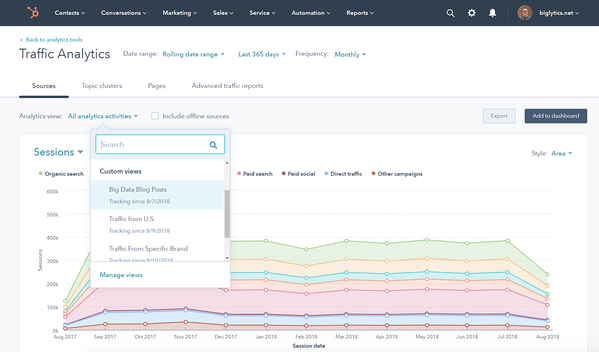How Marketers Save Time and Make Data-Backed Decisions with AI Reporting [+ Expert Insights]

By Ankit Vora
Marketers are often asked to do more with less. I’ve been there too.
I’ve battled the constant pressure to juggle multiple campaigns, track their performance, and present insight-packed reports. This process is overwhelming, time-consuming, and riddled with challenges.
After years of struggling to prepare reports for my marketing campaigns, I discovered how AI reporting can truly transform the process — and empower creativity with data-backed strategies.
In this article, I’ll discuss:
Crucial Challenges Marketers Face in Traditional Reporting
Throughout my decade-long career in marketing, one of the most significant (and repeated) challenges I’ve had was reporting my work and attributing it to revenue.
I’m sure every marketer agrees that traditional reporting methods are complex and time-consuming. Reporting feels like rocket science with so many moving parts.
Here are some challenges I’ve faced and observed in marketing reporting.
- Tedious data collection. I’ve spent hours (and even days) consolidating, cleaning, and organizing data from different tools to build a report. I realized that a key reason marketers struggle to build a robust reporting setup is due to this inefficient and error-prone process of collecting data manually.
- Inability to measure ROI. My biggest concern with traditional reporting methods is the lack of measurable outcomes in many marketing campaigns. It’s much harder to directly attribute specific top-level metrics (like clicks, impressions, and likes) to meaningful business outcomes (like customer acquisition, retention, etc.). So, while you know how well a campaign performed, you don’t have enough proof to tie it to the results achieved.
- Siloed data. Having worked with several B2B organizations, I’ve observed that each department often works in isolation. As a result, customer data is siloed and inaccessible to every team. The sales team uses a CRM system, the marketing team relies on multiple analytics tools, and the support team works on a customer success platform. This hinders marketers’ ability to get the whole picture about their performance.
- Limited customization. Traditional reporting tools aren’t easily customizable for your reporting needs. I tried working backward with my goals to set up my reporting system, but I couldn’t fully customize my tools to track the necessary metrics. This lack of flexibility is another big reason marketers must spend extra time and effort on data-based reporting.
- Meaningful data interpretation. Lastly, after trying several reporting tools, I can say that most tools only process and visualize data. They don’t offer contextual guidance on what actions to take based on the data. I’ve spent most of my time interpreting data at scale and documenting the key takeaways to help stakeholders make data-driven decisions.
The traditional reporting setup is riddled with challenges for marketers. And it only …read more
Source:: HubSpot Blog

![Download Now: 100 ChatGPT Prompts for Marketers [Free Guide]](https://no-cache.hubspot.com/cta/default/53/c497a8fe-0f60-4244-9cb1-5bed4d1e5ab6.png)






